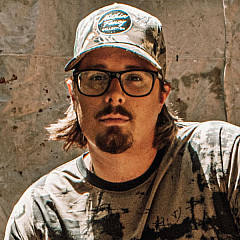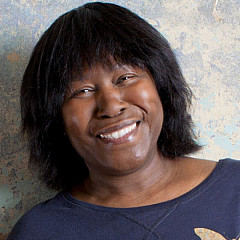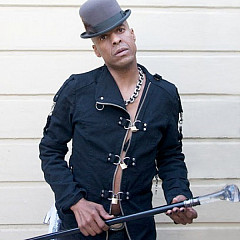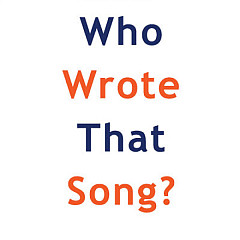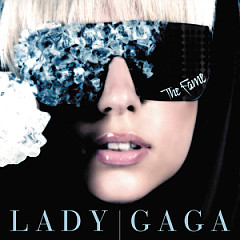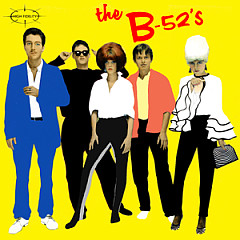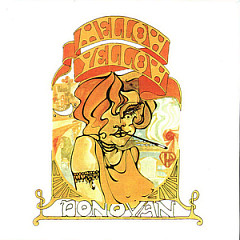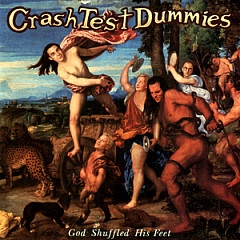She began her career singing in the Bluebelles alongside Patti LaBelle and Sarah Dash - they had a girl group hit in 1962 with "I Sold My Heart to the Junkman." With competition from similar acts like Diana Ross and the Supremes, the Bluebelles had to prove there was more to this trio than satin dresses and bouffant wigs. Under the new name Labelle, they left behind their doo-wop ballads and instead delivered messages of empowerment to the beat of funk rock - messages penned by Hendryx.
By 1974, Labelle reinvented themselves again with a flashier look inspired by glam rock and had a huge hit with "Lady Marmalade." The song was remade in 2001 for the film Moulin Rouge! by Christina Aguilera, Lil' Kim, Mya and Pink.
Hendryx soon struck out on her own as an R&B singer, a safe choice, according to record label execs, for a black woman aspiring to be a rock star. But Hendryx has never been comfortable in a box. Determined to make a lasting imprint in and out of the R&B world, she always tries to break new ground. For instance, she sang in the experimental funk group Material and brought her funky vocals to Talking Heads' albums and tours. She was also a proud member of the Black Rock Coalition, an organization founded by Living Colour's Vernon Reid with the intent of bringing rock music back to its black roots. (As she revealed to Songfacts, Hendryx is also related to the most famous electric guitarist of all time.)
Her talent has taken her to sonic planets where few other R&B singers have gone. She's sung duets with Billy Vera ("You Have to Cry Sometime"), as well as Culture Club's Boy George ("Giving Him Something He Can Feel").
Hendryx is also an actress and a political activist - and she's not slowing down any time soon.
 Dan MacIntosh (Songfacts): You wear so many different hats. The hardest thing for me in preparing for this interview was knowing where to start. So I'm going to start where I first discovered your music. I was a really big fan of the Talking Heads, who you recorded and toured with. So I wanted to ask you first of all what are your favorite memories from those collaborations, what sticks out in your mind?
Dan MacIntosh (Songfacts): You wear so many different hats. The hardest thing for me in preparing for this interview was knowing where to start. So I'm going to start where I first discovered your music. I was a really big fan of the Talking Heads, who you recorded and toured with. So I wanted to ask you first of all what are your favorite memories from those collaborations, what sticks out in your mind?Nona Hendryx: There are so many. From working in the studio with Brian Eno and Daniel Lanois, working on the music, recording, being in that process. And then also just hanging out with all of the Heads, sitting in rehearsals or when they're creating their music. We would get together and work on music as it was developing, so it really became an extended band feeling. Because people who were friends of mine who had worked in my band were now in the Talking Heads band, Dolette McDonald, Bernie Worrell, Steve Scales, the percussionist. I've known Buster Cherry who played for the Heads in the early days before I saw them playing at the Whisky a Go Go in L.A. many years ago, years before they became really successful as the Talking Heads.
And Jerry worked on a couple songs with me with Buster Cherry outside of the Talking Heads. And I did a cover of "Itching in My Heart" which is a pretty interesting cover. And then working on Jerry's album with him - The Red and the Black - that was really a great experience. I learned a lot, especially in my producing skills. It was really an extended band experience where I was a part of them but not officially a Talking Head. But kind of I am. It was a great time in music where people would still cross their musical lines - integrating music and developing. They were a great band at doing that.
Hendryx: Wow. Yeah, of course, the Remain In Light album, I can't remember the titles. Just throw some titles out at me and I can tell you which ones. That's funny.
Songfacts: Was there one called "I Zimbra"...
"I Zimbra" actually appeared on Talking Heads' Fear of Music. Hendryx didn't participate in recording the song, but performed it with them after she joined their touring band.
Hendryx: Yeah, "I Zimbra." Yeah. That's a great one. The whole sort of the feel of that and the motion, the rhythm that, well, it's just a cool rhythm. It's African, but western and almost South American. That's one of my favorites. In the Speaking In Tongues album, I can't think of the titles. When I hear them I can tell you.
Songfacts: Was David Byrne easy or difficult to work with?
Hendryx: A bit of both. It was great working with him and working with Jerry, because they wanted you to bring to the music what you had to offer in terms of vocals and some of the vocal rhythms. You were engaged and involved in the development of the part that you play. But David also had very specific things that he wanted, as well. With writing the songs, he really would be a stickler. Sometimes he would do a guide vocal so you really got the rhythm of what it was that he was trying to do or what he wanted to do.
With some artists you have to sing every note exactly as they've written it, but there was freedom within David's music. When you hear those records and you hear other records that David has produced since, it's more of the African black voice and musical influence that you hear.
Songfacts: I think it's interesting that you were a founding member of the Black Rock Coalition. As difficult as it is for Black men to get respect for playing rock and roll, like Living Color and some of the bands that really helped that movement, I can't imagine how difficult it is as a woman. Have you found it difficult to be respected within the rock community for what you do?
And then on the white side, it's that the music is the rock and roll, which came from Chuck Berry or Fats Domino or the earlier proponents of it. It seems that now it's been co-opted by a white audience and projected to be that it is not a Black music. So you're kind of caught in the middle. If it's your musical drug of choice that you must do or you feel the influences and it comes out in the music, you're constantly trying to have people understand and accept what it is that you're doing. Which is in a way why I can identify with the jazz musicians that I know.
Songfacts: I take it from some of the music on your latest album that you won't be performing at any Tea Party rallies anytime soon?
Hendryx: (Laughing) Not unless they'd like a visit from the opposition. If they're willing to have an open mind and listen and hear what I have to say - because I have to hear a lot of what they have to say - then yeah, I'll show up. I'm not afraid. We live in the same country. At some point that's what our country is about; it's about a democracy so that everybody has a voice and people can come together and agree to disagree. And standing on either side of the street yelling at each other is not going to get it done. So yeah, tell the Tea Party to call me up and book me. Because I've got some information for them.
Hendryx: Yes, it is.
Songfacts: And do you know her and did she ask you to come on to the label? How did you connect with the label?
Hendryx: I know Ani, I met her through a group on the label, and that's how I know her. When I was doing this record, I just did it myself because I felt the urge to do it and my fans kept asking me when am I going to do another record. And I've been working with a new manager, Lisa Barbaris, who manages Cyndi Lauper. And Lisa was talking to different people about putting the CD out on a stronger or a wider level than the amount of people that I could reach myself. And one of the people who came back who she sent it to and played it to was Ani and the people at her label. They came back and said, We'd love to work with you, we're small, we can only do certain things. But this is a record that we feel would work for our label and Ani likes it and let's see what we can do. And I thought, well, this is a good place to be. I love Ani's work and she's just done amazing music and also what she's done as a woman and trailblazer in forming her own label and all the other things that come from it, the theatre.
I thought it was great because I have areas that I mined in terms of striking out on my own and going my own way. So I thought it was a good combination.
Songfacts: Since it had been so long since you put out an album of your own songs, did you have a lot of songs saved up or did you wait and write songs when you were ready to record? How did you go about creating the songs for this album?
Hendryx: Some of them were written before. I never stopped writing, and so I have probably enough for about 4 or 5 albums. So I will slowly, hopefully, get to them. But this one, because of the climate of the political and social issues in America, it became more imperative as President Obama went through this election process, and the response that many of the people on the far right and right had and have had to him, and the issues that are individual rights issues, they were just sort of boiling, and things that for me I feel I needed to speak to, respond to. That's really what pushed me to write additional songs about the issues and then to put them together into a CD.
So some of them were written over the last 10 years, starting with the World Trade Center, 9/11, and then all the way through the things that happened, and to my view and to my mind, our country, they were like little pieces that were taken from the fabric of who we are, some by outside forces and some by internal forces that I've never seen so vividly before.
Songfacts: Was it a sense of relief when you were able to record some of these songs, you were able to get some things off your chest?
Songfacts: When you think back on your days with Labelle, do you remember those days fondly?
Hendryx: Yes, I do. I do. It was a great time for me, for us as a group, and then also just in music. It was so many more areas and possibilities. There were more labels, there were more venues, there were smaller venues, just the action of the record industry was a record business, before it became "the industry" and killed itself. The record business was much more about music. And yes, it was a business, but still there was part of it that really was about "let's make some music and make an album." Something that somebody could go and sit down and listen to, and not "let's make a single, and hope they buy the album."
It had gone away from that early time, which was single oriented to a place where people really expressed themselves in a longer form.
Songfacts: You've seen so much. You started out as a girl group singer.
Hendryx: I kind of did. [Laughs]
Songfacts: And then you've been into the progressive music and you've done so many things. Are you hopeful for the future of music or do you look at these sort of dark days ahead?
Hendryx: I'm always hopeful about music. There is so much music in the world. And with the Internet, though it has its drawbacks for certain areas, it has opened up the world to music. I think that's a wonderful thing, because there were the gatekeepers that closed the door, and the only access was by who you know or how much money you have. And now, it isn't. The only barrier is being able to get your information up there for people to see.
The gatekeepers are trying to move in again by owning all the territory, but still today, somebody in Slovenia could put up something and I could find it. Or they could post it on my page on Facebook, or they could tweet it. So the possibility for a vibrant musical culture is there.
Songfacts: When you perform live, what are your favorite songs to sing?
Hendryx: My favorite to songs to sing are "Lock This House," "Let's Give Love A Try," "Tea Party," of course, "Winds of Change," which is on an earlier album for a song I wrote for Nelson and Winnie Mandela. "Transformation," which is a fun song. And "I Sweat," which is always fun and great for the audience to get involved in shaking their booty.
Songfacts: That's right. That was from the soundtrack. Was that Perfect?
Hendryx: It was from my album, but it was on a soundtrack. It was Perfect, I think, yes. And what else, I do "Strange Fruit," the Billie Holiday Song, that's on this new CD.
Songfacts: That's such an amazing song, wow.
Hendryx: It really is. And live, I add in part of Martin Luther King's "I Have A Dream" speech. It's a cathartic performance for me to do that song. It's like healing, and healing's what happens. And hopefully it can reach the ears and the minds and the hearts of people who are still feeling any bigotry, hatred, racism, to understand that this was a painful time in our history, in our past and in America. And that we need to move on from there.
Songfacts: I'm just so impressed with your career. There are so many artists that came from the same era and are on the oldies circuit, they're collecting a paycheck for something they did 30, 40 years ago. And yet you're still making new music and writing new songs.
Hendryx: Thank you. And I understand the people who are doing the oldies shows. Because if you're not the creator of your music, and you're a singer or a singer in a band, it's harder to keep moving forward because you're not compelled to write. And so therefore to create something new is not really a part of your makeup or your tool.
I became a singer because I was a writer. And that is the difference for me. I am compelled to write. And so I sing because I can express/translate what it is I've written emotionally to people.
Songfacts: And you even wrote a lot of those songs for Labelle, right, even though you weren't the main vocalist.
Hendryx: Yes. And that's where I began and when you asked me about the period of Labelle, that is just an amazing gift that was given to me, because I didn't know that I could write music. I wrote poetry in school. But because of the management that we had at the time, they managed the Who and they'd signed Jimi Hendrix and they had other bands who wrote their own music. And they believed that artists should and could do that. They asked us if any of us could write, and I said, "Well, I write poetry." And they said, "Well, why don't you try putting it to music?" And that's where it began.
Songfacts: This might come off as a silly question, but because you share a last name with Jimi Hendrix, do people ever get you confused or think there's a relationship?
Hendryx: Yes. But then I recently found out that we are related, and my last name really should be spelled with an "i" and not with a "y". My mother and two sisters married two brothers and a cousin. And all my cousins spell their last name with an "i." I spell mine with a "y." I don't know what happened. But when my mom died a few years ago, we found her marriage certificate, and it is with an "i." So my assistant and I started doing some investigating on Ancestry.com, and we found the connection to John Hendrix, who is on my father's side, my grandmother's father's father. So I am a cousin, I guess maybe third or fourth removed, I can't remember which it is, to Jimi.
Songfacts: Well, I'm glad I asked now.
Hendryx: It's complicated and I didn't realize that. Also looking, I found that my heritage is Scottish, and West African.
Songfacts: Well, my last name is MacIntosh, so I've got deep Scottish roots. So we have a connection.
Hendryx: Oh, great. Mine's Brown. My great great great grandmother's name is Mary Brown; her father was Louis Brown from Scotland.
August 7, 2012
Get more at nonahendryx.com
Photo: Sheila L Jackson
More Songwriter Interviews

